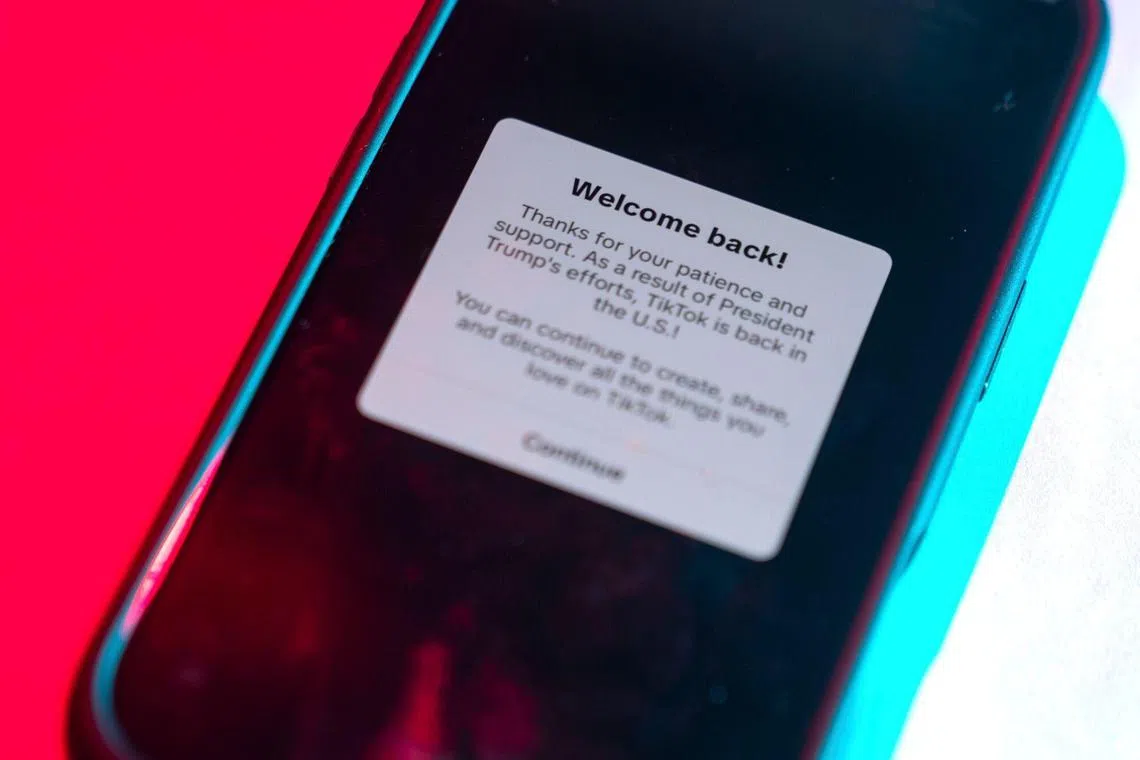TikTok restores US service after Trump says ‘we have to save it’
Sign up now: Get ST's newsletters delivered to your inbox

A message welcoming users back and thanking US President-elect Donald Trump on the TikTok app on a smartphone in the US.
PHOTO: BLOOMBERG
WASHINGTON – TikTok restored its service in the US on Jan 19 after briefly going dark
TikTok credited US President-elect Donald Trump, who retakes power on Jan 20, for making the reversal possible – though the outgoing administration of President Joe Biden had earlier said that it would not enforce any ban.
The video-sharing app had shut down in the US late on Jan 18 as a deadline for its Chinese owner ByteDance to sell its US subsidiary to non-Chinese buyers loomed.
Earlier on Jan 19, as millions of dismayed users found themselves barred from the app, Trump promised to issue an executive order delaying the ban to allow time to “make a deal”.
He also called, in a post on his Truth Social platform, for the US to take part-ownership in TikTok.
The President-elect said he “would like the United States to have a 50 per cent ownership position in a joint venture”, arguing that the app’s value could surge to “hundreds of billions of dollars – maybe trillions”.
“By doing this, we save TikTok, keep it in good hands,” wrote Trump, who had previously backed a TikTok ban and during his first term in office made moves towards one.
In a statement posted on X following Trump’s comments, TikTok said it “is in the process of restoring service”.
“We thank President Trump for providing the necessary clarity and assurance to our service providers that they will face no penalties providing TikTok to over 170 million Americans.”
Beijing on Jan 20 urged Washington to listen to “rational voices” over the ban.
Foreign Ministry spokeswoman Mao Ning also said China attached “great importance to and protects data privacy and security”.
“We have never and will not ask companies or individuals to collect or provide foreign data located in foreign countries in a way that violates local laws,” she said.
TikTok, which was back online in the US by the afternoon of Jan 19, did not address Trump’s call for part-American ownership of the app.
Wedbush Securities analyst Dan Ives told AFP the episode “marked a big win for TikTok and a political win for Trump”.
“The TikTok app was going to stay dark and Trump came to the rescue in this political game of high stakes poker between the US and China,” he said.
President-proof?
At a rally on the eve of his inauguration on Jan 19 at a Washington sports arena, Trump hammered home his enthusiasm for saving the app, telling the crowd, “frankly, we have no choice, we have to save it”, while indicating that there were a “lot of jobs” involved.
“We don’t want to give our business to China, we don’t want to give our business to other people,” he told his supporters.
The law allows for a 90-day delay of the ban if the White House can show progress towards a viable deal, but, so far, ByteDance has flatly refused any sale.
The Biden administration said it would leave enforcement of the law to Trump.
From teenage dancers to grandmothers sharing cooking tips, TikTok has been embraced for its ability to transform ordinary users into global celebrities when a video goes viral. But it is also rife with disinformation, and its Chinese ownership has long spurred national security fears, internationally as well as in the US.
The Jan 19 blackout came after the US Supreme Court on Jan 17 upheld legislation banning TikTok pending any sale.
President-elect Trump, who signed an executive order stepping up pressure on ByteDance to sell its US assets in 2020, has since credited the app with connecting him to younger voters.
It is unclear what the incoming President can do to lift the ban unless ByteDance ultimately sells its assets, however.
“Congress wrote this law to be virtually president-proof,” warned Mr Adam Kovacevich, chief executive of industry trade group Chamber of Progress.
Besides removing TikTok from app stores, the law requires Apple and Google to block new downloads, with the companies liable for penalties of up to US$5,000 (S$6,840) per user if the app is accessed.
Oracle, which hosts TikTok’s servers, would also be legally obligated to enforce the ban.
‘I love TikTok’
In Europe, TikTok’s suspension drew praise from Estonia’s Foreign Minister Margus Tsahkna, who said on X that banning the platform “must be considered in Europe as well”. The ban even became a hot topic at the Australian Open in Melbourne, where American tennis player Coco Gauff scrawled “RIP TikTok USA” on a courtside camera.
Meanwhile, in the US state of Wisconsin, a man was accused of igniting a fire early on Jan 19 at a building where a member of Congress keeps an office, in response to recent talks of a TikTok ban, the police in the city of Fond du Lac said in a statement.
The building was unoccupied, no one was hurt and the man is facing arson charges, the police said.
A last-minute proposal made on Jan 18 by highly valued start-up Perplexity AI offered a merger with the US subsidiary of TikTok, a source with knowledge of the deal told AFP.
The proposal did not include a price, but the source estimated it would cost at least US$50 billion. AFP


